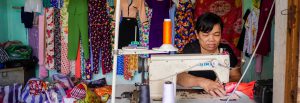“How will I afford to buy my daughter’s school supplies?†“How many harvests will I have this year?†“What if my rice paddy is annexed to build a highway?†“If I leave the house at 2:00 A.M. to get to the market, will I have enough energy to work the rest of the day?†“How much income will I lose if I take time each day to bring my children to school and back home again?†“If I just skip breakfast every day, will I be able to save some money for my son?â€
These are worries expressed by single mothers who we met recently in the beautiful countryside just outside Danang, Vietnam. Being a single mother in this area presents many challenges. The World Bank states that women are more likely to experience higher rates of unemployment and to have “vulnerable forms of employment.†According to UN Women, some 53% of all employed women in Vietnam work as unpaid family laborers, compared to 32% of employed men. Women in the informal sector do not receive protections or benefits, and have lower wages and limited access to skills development and training.

Single mothers living in poverty struggle to ensure nutritious diets for themselves and their families, which can permanently impede children’s ability to live up to their full cognitive and physical potential. Childhood stunting remains a persistent problem in Vietnam, and almost 2.1 million children under the age of five are considered too short for their age. Providing improved income opportunities for women is a key pathway to ensuring access to full and nutritious diets for Vietnamese children.
Rise Against Hunger and Children of Vietnam (CoV), have been partners in eradicating poverty in Central Vietnam for 10 years, primarily working together to distribute Rise Against Hunger meals through education and medical programs. Rise Against Hunger and CoV will scale up their work in 2017 to break the cycle of poverty for children and families by assisting single mothers to improve their incomes through a new program called Empowerment through Enterprise (EtE).

To be eligible for participation in EtE, women must have already participated in CoV’s Empowering Foundations for Women & Their Children (EFWC) program and currently operate a micro-enterprise. The EFWC program launches women on the path to income sustainability with a combination of microloans, healthcare, education and housing assistance focusing on developing lifelong skills to better able them to provide for their children. The EtE program will train the women on business and financial literacy skills, including writing a business plan that will then be funded with a small grant.
In spite of the many challenges they face, the mothers we met displayed tenacity, poise and a strong dedication to their children. With support to scale up their small enterprises, they will have the tools necessary to increase their incomes and improve their families’ food security.
Please visit our Empowering Communities page to find out more about Rise Against Hunger’s efforts to build sustainable communities around the globe.

This guest blog was written by Julie Savane and Ryan Tsipis. Julie is the Food Security Monitoring & Evaluation Manager at Rise Against Hunger. For almost two years, she has managed relationships with meal distribution partners and built their capacity to implement and report on food security programs. Ryan Tsipis started as an intern for Rise Against Hunger in 2013. After working in many different departments, she found her home on the Global Impact Team in August 2016. Ryan works with all global offices to aggregate data and work on other special projects related to Rise Against Hunger food security programming.
Micro-Enterprise Initiative Seeks to...
 "
"